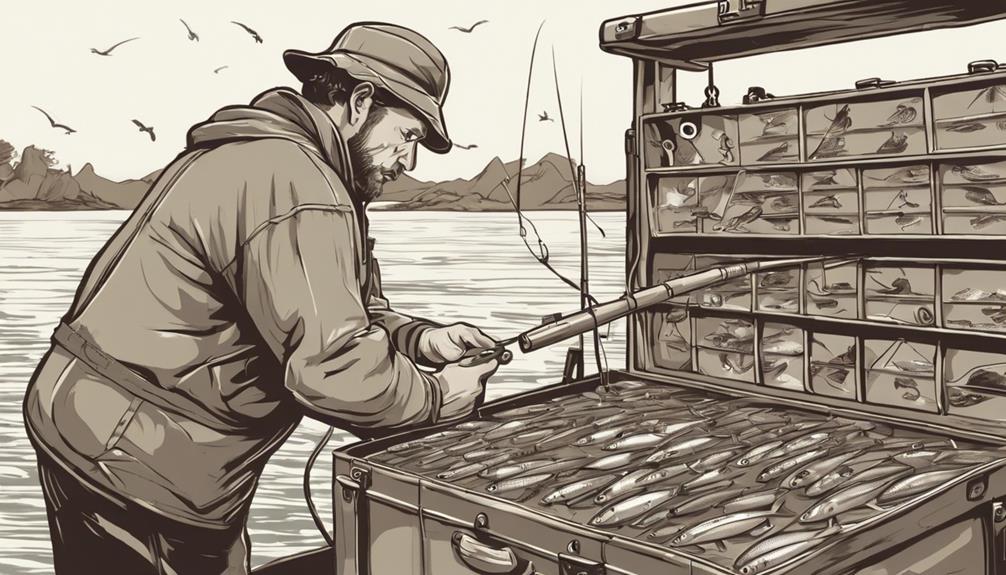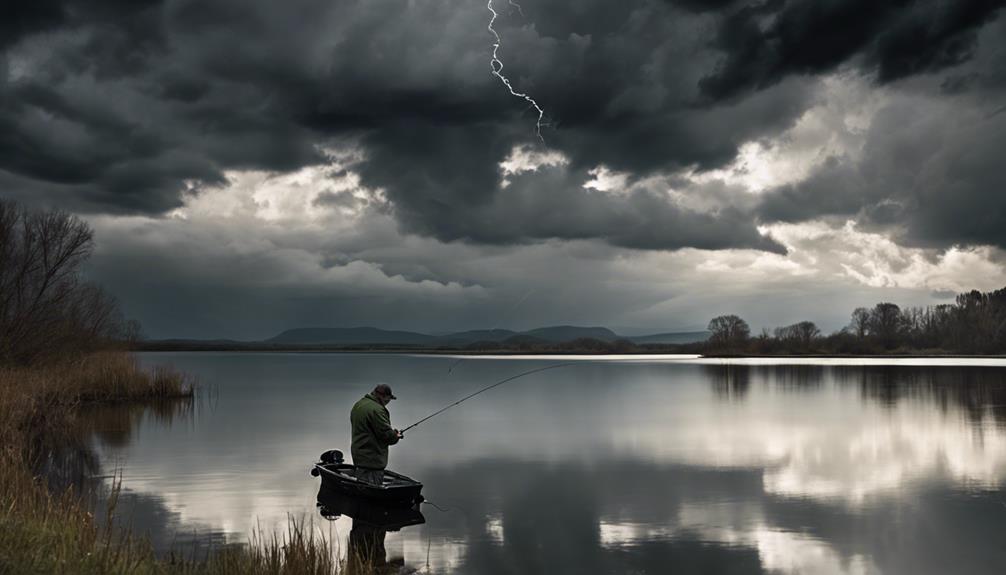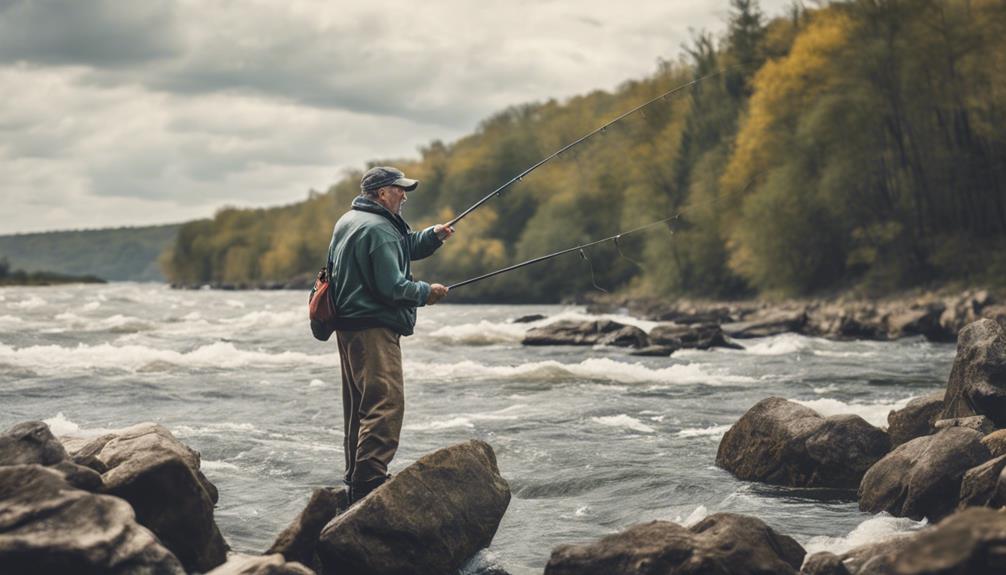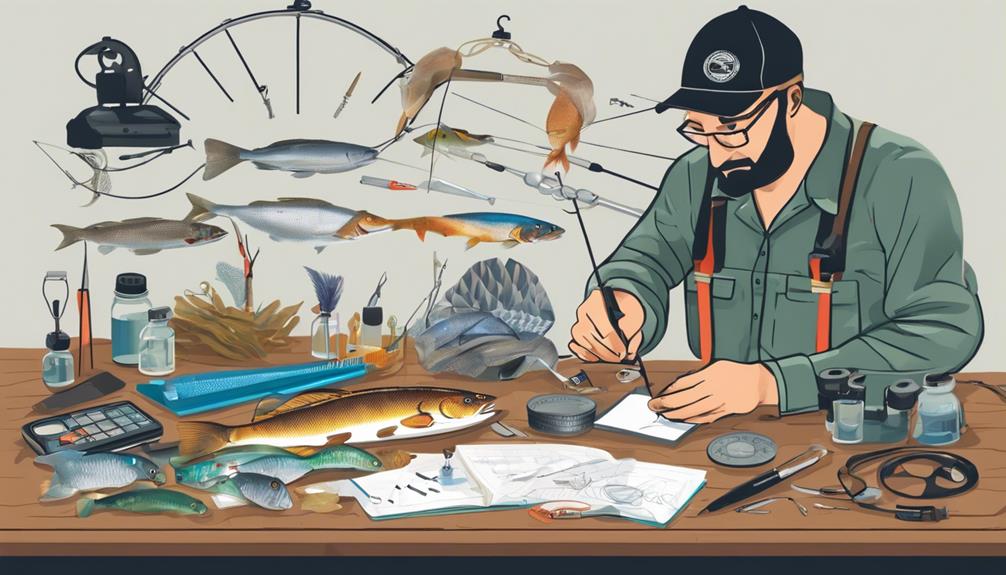When it comes to angling competitions, think of these strategies as the finely tuned instruments in a skilled musician's orchestra. Each one plays a critical role in your performance on the water. From understanding the subtle nuances of the competition environment to mastering the art of hook setting, the success of your angling endeavors hinges on your ability to execute these strategies flawlessly.
So, why are these techniques so crucial for competitions? The answer lies in the intricate dance between angler and fish, where every move you make can determine your fate in the tournament.
Understanding the Competition Environment
To excel in angling competitions, familiarize yourself with the competition environment. Mental preparation is key in ensuring you maintain a focused mindset throughout the competition. Before the event begins, take some time to observe your competitors. Pay attention to their gear, body language, and any patterns in their movements. This can give you valuable insights into their strategies and techniques, allowing you to adjust your own approach accordingly.
Strategic positioning is another crucial aspect to consider when understanding the competition environment. By observing competitors, you can identify where the hotspots are likely to be and plan your positioning accordingly. Remember, in angling competitions, every decision counts, so being in the right place at the right time can make all the difference.
As you familiarize yourself with the competition environment, stay adaptable. Conditions can change rapidly in angling, so be prepared to adjust your strategy on the fly. Keep a keen eye on your surroundings, the weather, and any shifts in the behavior of the fish. By staying attuned to these factors, you can make informed decisions that give you an edge over the competition.
Mastering Different Casting Techniques
Master your casting techniques by practicing precision and control in your movements. Precision casting involves mastering advanced techniques that require finesse and accuracy. To excel in competitions, it's crucial to hone your skills in distance casting and engage in accuracy drills regularly.
When it comes to precision casting, focus on executing techniques such as flipping, pitching, and skipping. These methods allow you to place your bait accurately in tight spots where fish are likely to be hiding. By practicing these advanced techniques, you can increase your chances of catching elusive fish during competitions.
For distance casting, work on your ability to cast long distances while maintaining accuracy. Use the proper technique to maximize your casting distance without sacrificing control. Engage in accuracy drills by setting up targets at various distances and practicing hitting them consistently. This will help you develop the muscle memory needed to place your bait precisely where you want it.
Utilizing Proper Bait and Lures
Developing proficiency in selecting the appropriate bait and lures is essential for maximizing your angling success in competitions. When it comes to angling, using the right bait and lures can make all the difference in attracting fish and securing your victory.
Here are some key points to keep in mind:
- Lure selection: Choosing the right lure for the specific type of fish you're targeting is crucial. Different fish species are attracted to different types of lures, so make sure to research and pick the most suitable one.
- Bait presentation: How you present your bait can significantly impact your chances of a successful catch. Pay attention to how you set up your bait to make it appear natural and enticing to the fish.
- Casting accuracy: A precise cast can mean the difference between landing your lure where the fish are and scaring them away. Practice your casting technique to improve accuracy and increase your chances of hooking a fish.
- Reel control: Mastering reel control is essential for smoothly reeling in your catch once you've hooked it. Knowing when to let the fish run and when to reel it in can prevent break-offs and ensure a successful landing.
- Experimentation: Don't be afraid to try out different baits and lures to see what works best in different conditions. Fish behavior can vary, so being adaptable and willing to experiment can give you an edge in competitions.
Perfecting Hook Setting Skills
How can you ensure a successful hook set every time you feel a bite while angling in competitions? Perfecting your hook setting skills requires precision timing and quick reflexes. When you feel that initial nibble or tug on the line, it's crucial to act swiftly and decisively.
To achieve a successful hook set, you must pay close attention to the subtle movements and signals transmitted through your fishing rod. The moment you detect a bite, don't hesitate – set the hook promptly with a firm and controlled motion. It's essential to strike while the fish is still holding onto the bait, ensuring a better chance of hooking it securely.
Practice is key to mastering the art of hook setting. Spend time honing your reflexes and timing by simulating bites and practicing your hook setting technique. By developing muscle memory and sharpening your skills, you'll be better equipped to react quickly and effectively when it counts.
Adapting to Changing Weather Conditions
When facing changing weather conditions while angling in competitions, your adaptability becomes a crucial factor in determining your success on the water. Being able to adjust your techniques to the shifting elements can make a significant difference in your performance.
Here are some key strategies to help you adapt effectively:
- Tackling wind variations: Wind can significantly impact your casting accuracy and the movement of your bait or lure. Adjust your casting angle and strength to counteract the wind's effects and ensure your presentation remains enticing to the fish.
- Adjusting to water temperature fluctuations: Fish behavior is closely tied to water temperature. In colder water, fish may be less active and prefer slower presentations, while warmer water can lead to increased fish activity. Be prepared to switch up your retrieval speed and bait selection based on the water temperature changes.
- Staying versatile with bait choices: Changing weather conditions may require you to experiment with different types of bait. Keep a variety of options in your tackle box to adapt to the preferences of the fish in response to the weather shifts.
- Monitoring cloud cover and light conditions: Cloud cover can affect fish visibility and feeding patterns. Be observant of changes in light intensity and adjust your fishing style accordingly, such as using brighter lures on overcast days.
- Adapting your fishing location: Shifts in weather can lead to changes in fish behavior and movement. Stay mobile and be willing to relocate to different spots to find where the fish are most active in response to the weather fluctuations.
Practicing Patience and Persistence
Maintaining patience and persistence while angling in competitions is key to achieving success in challenging conditions. Developing focus is crucial when faced with obstacles such as changing weather patterns or elusive fish. By honing your ability to concentrate on the task at hand, you can increase your chances of making a successful catch.
In the midst of competition, it's easy to feel the pressure mounting, but it's essential to maintain composure. When faced with setbacks or slow fishing periods, keeping a cool head can make all the difference. Remember, fishing competitions aren't just about luck; they also require a strategic mindset and a resilient attitude.
Practicing patience is about understanding that not every cast will result in a fish being caught. It's about embracing the process and enjoying the journey, even when the results aren't immediate. Persistence is equally important—don't give up after a few unsuccessful attempts. Keep trying different techniques, adjusting your approach, and learning from each experience.
Learning Fish Behavior Patterns
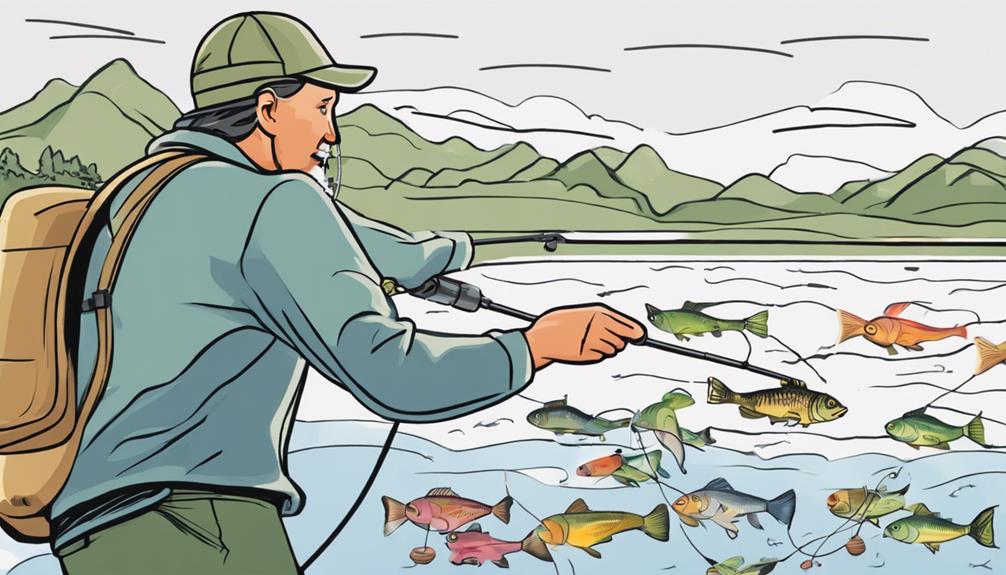
Understanding fish behavior patterns is crucial for angling success in competitions. Observing underwater habits and analyzing feeding movements are key aspects that can give you an edge over other competitors. When you grasp these patterns, you can strategically plan your angling techniques to maximize your chances of catching more fish.
Here are five essential tips to help you learn fish behavior patterns effectively:
- Study the Environment: Take note of the water conditions, temperature, and clarity as these factors influence fish behavior.
- Observe Prey Species: Understanding the types of prey fish in the area can help you anticipate where larger fish might be lurking.
- Identify Prime Feeding Times: Fish are more active during certain times of the day, so knowing when they feed most actively can improve your chances of a successful catch.
- Learn Movement Patterns: Different species of fish have distinct movement patterns; observing these can guide your bait placement and retrieval techniques.
- Use Technology: Utilize tools like fish finders or underwater cameras to enhance your understanding of fish behavior in specific locations.
Engaging in Ethical Practices
To ensure fair competition and environmental sustainability, prioritize engaging in ethical practices while participating in angling tournaments. Conservation efforts and ethical angling are essential components of sustainable practices and competition ethics. When competing, it's crucial to uphold ethical angling standards by practicing catch and release, minimizing harm to fish populations, and respecting fishing regulations. By following these guidelines, you contribute to the conservation of fish species and their habitats, ensuring their survival for future generations.
Engaging in ethical practices also involves using proper gear and techniques to minimize stress and injury to the fish. Avoid using barbed hooks, which can cause more harm during hook removal, and opt for artificial baits instead of live bait to reduce the risk of deep hooking. Additionally, handling fish with wet hands or using a rubberized landing net can help protect their delicate skin and scales.
Furthermore, it's essential to be honest and transparent during competitions. Adhering to competition rules and regulations, reporting your catches accurately, and avoiding unethical behavior such as cheating or dishonesty are all part of maintaining competition ethics. Remember, the true spirit of angling competitions lies in sportsmanship, camaraderie, and respect for the environment. By embracing ethical practices, you not only enhance your angling skills but also contribute to the long-term sustainability of the sport.
Frequently Asked Questions
How Can Anglers Effectively Deal With Distractions and Outside Influences During Competitions?
When you're in a competition, handling distractions and outside influences is key. Using mindset management and focus techniques can help you stay on track.
Pay attention to environmental factors and practice performance psychology to keep your head in the game. Stay focused on your goal and mentally prepare yourself to block out any distractions that may come your way.
Are There Any Specific Regulations or Rules Anglers Need to Be Aware of in Competitive Fishing?
When competing in fishing tournaments, it's crucial to follow specific competition rules and etiquette. Familiarize yourself with regulations on gear, techniques, and ethical angling practices.
Make sure to adhere to size limits, catch-and-release guidelines, and any other tournament rules set by organizers. By understanding and respecting these regulations, you can compete fairly and contribute to a positive competitive fishing environment.
What Are Some Common Mistakes Anglers Should Avoid in Order to Improve Their Chances of Success in Competitions?
To improve your chances in competitions, focus on avoiding distractions and maintaining mental sharpness. Common mistakes to steer clear of include losing concentration, neglecting to adapt to changing conditions, and not paying attention to the details.
Stay committed to your game plan, stay aware of your surroundings, and stay patient. By sidestepping these errors, you'll position yourself for success in competitive angling.
How Do Anglers Handle the Pressure and Stress of Competitive Fishing?
When facing pressure and stress in competitive fishing, mental preparation is key. Use performance psychology techniques to stay focused and manage stress effectively.
Practice deep breathing exercises and visualization to calm your mind. Establish a pre-competition routine to get into the right mindset.
Stay present and focus on the task at hand to avoid getting overwhelmed. These strategies will help you handle the challenges of competitive fishing with confidence and composure.
Are There Any Specific Techniques or Strategies That Are Considered Unconventional but Effective in Competitive Angling?
When it comes to competitive angling, some anglers rely on unconventional methods to gain an edge. Tactical approaches like using unexpected bait or fishing in less crowded spots can sometimes lead to success.
It's all about thinking outside the box and trying new strategies to outsmart the competition. These unique techniques mightn't always be the norm, but they can be surprisingly effective in helping you secure that winning catch.
Conclusion
So, remember, in order to excel in angling competitions, you must understand the competition environment, master different casting techniques, utilize proper bait and lures, perfect hook setting skills, adapt to changing weather conditions, practice patience and persistence, learn fish behavior patterns, and engage in ethical practices.
By incorporating these strategies into your angling routine, you'll increase your chances of success and come out on top in competitions.
Keep honing your skills and never stop learning in the world of competitive angling.
